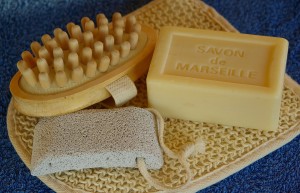Christian Soap
Have you noticed how much kids enjoy getting dirty? Making mud pies. Picking up worms. Dropping their gum, invoking the five-second rule and putting it back in their mouths. Yuck!
Whether it’s next to godliness or not, cleanliness is certainly healthier for us. Partially due to a lack of hand-washing, increasing numbers of patients are contracting infections in the one place they should expect to get better – hospitals. This trend has led to programs by the Centers for Disease Control (CDC) to increase awareness of the importance of hand-washing by healthcare personnel and visitors.
But can we be too clean? Germophobes – more accurately called mysophobes – are usually the butt of jokes. A popular television show a few years back featured a detective who disliked shaking hands. When Adrian Monk did have to touch another person, he quickly used a sanitary wipe to remove the germs.
We may laugh at such extreme reactions, but we’re not exempt either. How many of us use antibacterial soap? Check your cleaning products – does the label say “kills 99% of household germs”?
 Turns out we may be working too hard to kill germs. Not only are we creating drug-resistant bacteria, we’re killing good germs, too. And by the way, scientists now say plain old soap usually works just fine in most instances anyway. Our culture is obsessed with cleanliness – physical, not moral. Guilt kicks in over failure to protect our children from germs lurking in their environment, but immoral behavior fails to register even a twinge in our collective societal conscience. Need proof? How about a new word – twerking – many of us reluctantly learned several years ago as a result of an actress’s graphic display on a televised awards program?
Turns out we may be working too hard to kill germs. Not only are we creating drug-resistant bacteria, we’re killing good germs, too. And by the way, scientists now say plain old soap usually works just fine in most instances anyway. Our culture is obsessed with cleanliness – physical, not moral. Guilt kicks in over failure to protect our children from germs lurking in their environment, but immoral behavior fails to register even a twinge in our collective societal conscience. Need proof? How about a new word – twerking – many of us reluctantly learned several years ago as a result of an actress’s graphic display on a televised awards program?
So what’s the answer? Do we become like the Pharisees of Jesus’s day, steeped in a culture of legalism that created excessive standards of cleanliness? Their separatist rituals even required the use of egg shells to measure the water used in washing. Or do we give in to the culture, since we’ll never be able to change it anyway?
Perhaps neither one is the answer. In fact, the answer doesn’t lie with us at all. If we are clean before God, it’s because He made us clean. It didn’t happen by trying harder or expending our efforts to do better. It happened through an admission that we can’t make ourselves clean. That our own righteousness is really not righteous at all. If we want to be cleansed from our natural tendencies toward moral filth, we need to receive the righteousness of Someone who really is righteous: Jesus Christ.
First John 1:9 (ESV) has been called the “Christian’s bar of soap” – “If we confess our sins, he is faithful and just to forgive us our sins and to cleanse us from all unrighteousness.”
Plain old soap. Even spiritually, nothing else works as well.
What are your thoughts?

Comments
Christian Soap — No Comments
HTML tags allowed in your comment: <a href="" title=""> <abbr title=""> <acronym title=""> <b> <blockquote cite=""> <cite> <code> <del datetime=""> <em> <i> <q cite=""> <s> <strike> <strong>